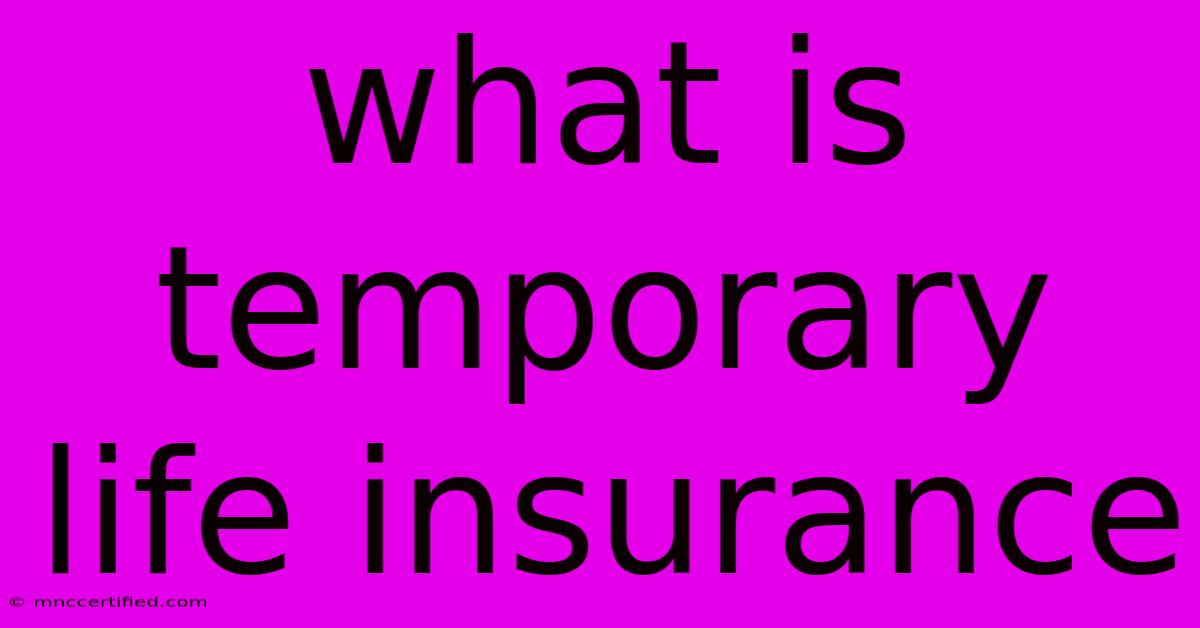What Is Temporary Life Insurance

Table of Contents
What is Temporary Life Insurance? Your Guide to Short-Term Coverage
Temporary life insurance, also known as term life insurance, provides financial protection for a specific period, or "term," as opposed to permanent life insurance, which offers lifelong coverage. Understanding the nuances of temporary life insurance is crucial before making a purchase, as it's a powerful tool for specific financial needs but not a one-size-fits-all solution. This comprehensive guide will break down everything you need to know.
Understanding the Basics of Term Life Insurance
At its core, term life insurance is a simple concept: you pay premiums for a set period (e.g., 10, 20, or 30 years), and if you die within that term, your beneficiaries receive a death benefit. If you outlive the term, the policy expires, and you're no longer covered unless you renew it (often at a higher rate).
Key Characteristics of Term Life Insurance:
- Defined Term: Coverage lasts only for the specified term length.
- Lower Premiums: Generally more affordable than permanent life insurance due to the limited coverage period.
- No Cash Value: Unlike permanent policies, term life insurance doesn't build cash value that you can borrow against or withdraw.
- Renewable: Most term life insurance policies are renewable, allowing you to extend coverage at the end of the term, though usually at a higher premium.
- Convertible: Some policies offer a conversion option, allowing you to switch to a permanent life insurance policy without a medical exam, although this will also likely increase your premiums.
Who Should Consider Temporary Life Insurance?
Term life insurance is a particularly good fit for specific circumstances and financial goals. Consider it if:
- You need coverage for a specific period: Perhaps you need coverage while paying off a mortgage, raising children, or until your children are financially independent.
- You're on a budget: Term life insurance offers substantial coverage at a lower cost compared to permanent options.
- You want a straightforward, uncomplicated policy: The simplicity of term life insurance makes it easy to understand and manage.
- You prioritize affordability over long-term cash value: If your primary goal is a death benefit, and you don't need a savings or investment component, term life insurance is a viable choice.
Types of Term Life Insurance Policies
While the core concept remains consistent, there are subtle variations in term life insurance policies:
- Level Term Life Insurance: Premiums remain constant throughout the policy term. This provides predictable budgeting.
- Decreasing Term Life Insurance: The death benefit gradually decreases over time, often mirroring the declining balance of a loan. This is commonly used for mortgage protection.
- Return of Premium (ROP) Term Life Insurance: If you outlive the term, you receive all or a portion of the premiums paid back. This comes with higher premiums than standard term life insurance.
How to Choose the Right Term Life Insurance Policy
Selecting the appropriate term life insurance policy requires careful consideration of several factors:
- Your needs: How much coverage do you need to protect your loved ones? Consider outstanding debts, future education expenses, and your family's lifestyle.
- Your budget: Determine how much you can comfortably afford in premiums each month.
- Your health: Your health status will significantly impact the premium you'll pay.
- The policy term: Choose a term length that aligns with your financial goals and life stage.
Before purchasing, compare quotes from multiple insurers to ensure you're getting the best possible rate and coverage.
Temporary Life Insurance vs. Permanent Life Insurance: Key Differences
| Feature | Term Life Insurance | Permanent Life Insurance |
|---|---|---|
| Coverage Term | Specific period (e.g., 10, 20, 30 years) | Lifelong |
| Premiums | Generally lower | Generally higher |
| Cash Value | None | Builds cash value |
| Flexibility | Less flexible | More flexible (loans, withdrawals) |
Frequently Asked Questions (FAQs)
Q: Can I renew my term life insurance policy?
A: Yes, most term life insurance policies are renewable, although the premiums will typically increase.
Q: What happens if I die before the term ends?
A: Your beneficiaries will receive the death benefit specified in your policy.
Q: Can I convert my term life insurance to a permanent policy?
A: Some policies offer a conversion option, but this will usually result in higher premiums.
Conclusion:
Temporary life insurance, specifically term life insurance, is a valuable tool for securing your family's financial future during a defined period. By understanding its features, benefits, and limitations, you can make an informed decision about whether it's the right type of insurance for your circumstances. Remember to carefully research and compare policies to find the best fit for your specific needs and budget. Consult with a financial advisor for personalized guidance.

Thank you for visiting our website wich cover about What Is Temporary Life Insurance. We hope the information provided has been useful to you. Feel free to contact us if you have any questions or need further assistance. See you next time and dont miss to bookmark.
Featured Posts
-
Triangle Blockchain Meetup Email
Nov 21, 2024
-
Towergate Coach Travel Insurance
Nov 21, 2024
-
Friends Obsession Boba Tea
Nov 21, 2024
-
Triton Insurance Company Payment
Nov 21, 2024
-
Chemical Bonding Test Answer Key
Nov 21, 2024